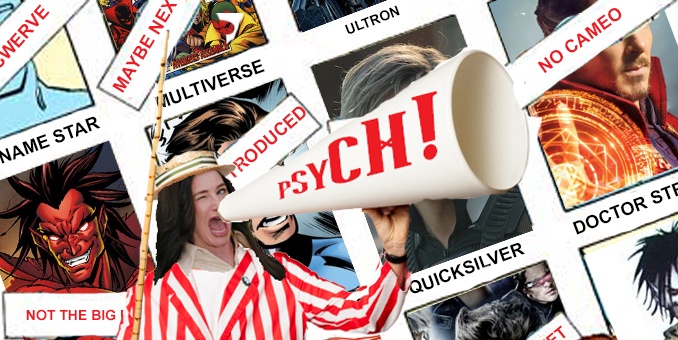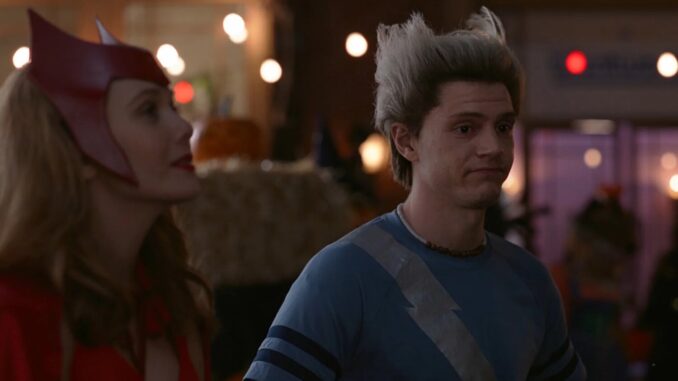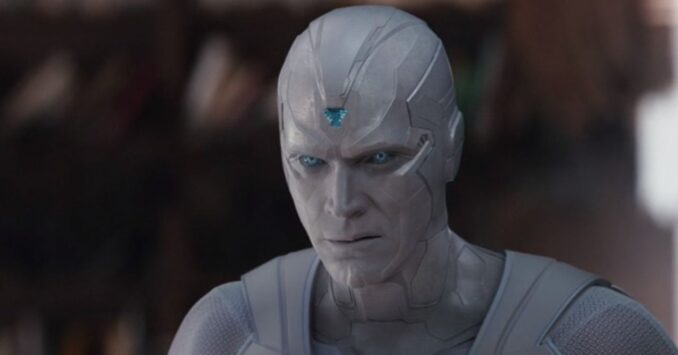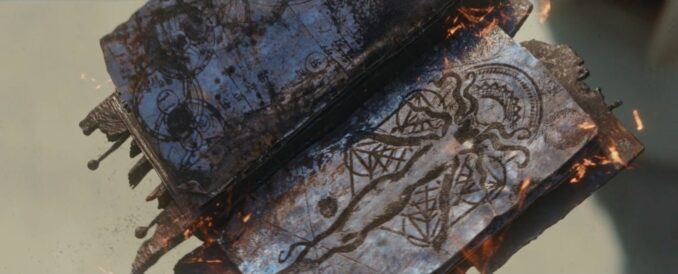
Spoiler Alert! The following article will contain spoilers for the first season and season finale of WandaVision.
For the most part, nobody likes to be teased. If you are coerced into entering a raffle by someone saying you are guaranteed to win a TV and you only get a Outback gift card, you are going to feel cheated. If the prettiest girl in the office only flirts with you only so you will do their work, you will feel used. Any time you are tantalized with something and don’t get it, you feel hollow.
Marvel Studios has always played the role of the teaser, tempting comic book fans and loyal viewers of the Marvel Cinematic Universe with new characters, storylines and actors. But, in the past, Marvel kept the red herring to payoff ratio in favor of the good payoff. With WandaVision they threw that out the window and decided to cruelly embrace the swerve. And the narrative suffered for it.
Marvel Studios seems to have a love/hate relationship with the fan press that covers the history of the MCU. They dislike websites hunting for spoilers, are annoyed answering questions from journalists about those spoilers, and are irked when plot points are revealed when the spoilers turn out to be true.
Taking that into consideration, the extent the creators feigned left and dodged right with WandaVision seems like an act of war against the spoiler brigade. But the fans got caught in the crossfire and the one writing this piece was angered by it.
Let’s run down the way Marvel Studios played with our emotions, shall we?
- Kathryn Hahn’s Agnes/Agatha Harkness kept referring to her husband Ralph during the show. Following the theory of Chekov’s Gun, we expected to see him during the show. And since the show made such a point of mentioning him, fan sites theorized that he would be the big bad of the show. perhaps Mephisto or Nightmare. No such luck. Ralph was just a red herring in this case. But I’ll return to “Ralph” in a moment.
- Teyonah Parris’ Monica Rambeau made specific mention of an “aerospace engineer” friend. Since the Disney purchase of Fox was done by time of shooting and aerospace engineer can fit one of his specific talents, fans thought the was going to be the way the MCU introduced Reed Richards. It wasn’t.
- Paul Bettany in the press run hinted at an big name actor joining the cast. “It is an actor I’ve longed to work with all of my life. We have some amazing scenes together and I think the chemistry between us is extraordinary and fireworks on set.” Fans started speculating that it could be anyone from Benedict Cumberbatch reprising his role as Doctor Strange to Ian McKellen entering the MCU as Magneto in addition to many others. But Bettany was only being cheeky. It was a tongue in cheek reference to his taking on the role as the White Vision in the finale.
- But perhaps most egregious was the introduction of Evan Peters playing Pietro Maximoff, Wanda’s brother. Every comic book movie fan knows that Peters played the same role in Fox’s X-Men films. His casting led people to speculate that this was the backdoor way to introduce the X-Men characters into the MCU and bring in the multiverse, which will be a major part of Phase 4. No, it was just an annoying swerve. Peters was really playing someone named Ralph Bohner, an ordinary, everyday resident of Westview Agatha brainwashed into helping her.
It seems like Marvel Studios forgot the lessons it learned eight years ago with Iron Man 3. That was the last time they promised one thing (the cinematic debut of classic villain Mandarin) and gave us something not quite as exciting (the Mandarin is just an actor, the true villain turned out to be an industrialist name Aldrich Killian). That infuriated many fans. As a result, a lot people consider that film one of the weakest entries in the MCU and Killian one of its worst villains.
At the time, I thought that the swerve was one of the better parts of an otherwise disappointing film. Because the swerve was done with wit and humor and was an integral part of the plot. The bait and switches in WandaVision weren’t quite as fun. Well, outside of Bettany’s, that is. It would have been a pretty funny, self-deprecating joke if he said it without everything else going on. Because that other stuff seemed cruel and punitive. Instead of delivering them to fans with a wink and a smile, they were delivered as a slap in the face. It was like Marvel Studios was telling its fans “Psych, suckers! Serves you right for being so invested in our products!”
And it’s not like fans were grasping at straws. Yes, there was some of that going around. A Google cast listing that featured James Spader would be in the show led fans that Ultron would be rebuilt in the series instead of the much more logical flashback appearance. That one’s on the fans. But the instances above were Marvel stoking the fire for whatever reason. I didn’t expect Reed Richards to make an appearance before that “aerospace engineer” comment, but I did afterward. And Marvel could have avoided this speculation if Monica gave that engineer a name–Raoul, Becky, Julian–the first time she mentioned him. They didn’t. They wanted fans to think Reed was coming.
 And, come on, they hire an actor who was the best part of an increasingly dismal decline of the X-Men series to play the same role he did in that series! Of course fans are going to think it was the start of Marvel Studios bringing the Fox films under their shingle! The “Ralph Bohner” reveal made me almost turn the show off. In retrospect, was there any need for the character to be in the show at all? You can remove him from the narrative and not much would change. Pietro’s main purpose in the show seemed to confuse and distract Wanda. That task could have been done by any other character in the series. He doesn’t even play a part in the climax. A couple brief scenes to reveal the swerve in the final episode and Pietro/Ralph is gone, never to be seen again. It seems Peters’ Pietro was added just so the producers could play a trick on us. Well done, Marvel.
And, come on, they hire an actor who was the best part of an increasingly dismal decline of the X-Men series to play the same role he did in that series! Of course fans are going to think it was the start of Marvel Studios bringing the Fox films under their shingle! The “Ralph Bohner” reveal made me almost turn the show off. In retrospect, was there any need for the character to be in the show at all? You can remove him from the narrative and not much would change. Pietro’s main purpose in the show seemed to confuse and distract Wanda. That task could have been done by any other character in the series. He doesn’t even play a part in the climax. A couple brief scenes to reveal the swerve in the final episode and Pietro/Ralph is gone, never to be seen again. It seems Peters’ Pietro was added just so the producers could play a trick on us. Well done, Marvel.
In other words, this is not a case, as Collider snidely suggests, “WandaVision Failing to Deliver Things That Were Never Promised to Me”. This is a case of Marvel playing with fan expectations, giving them obvious hints that they knew fans would pick up on (and discuss endlessly on the Internet, giving the show scads of free publicity), and then failed to deliver on the promises. You wouldn’t accept it from a used car salesmen, you’d avoid it if it came from an Internet spammer, and it wouldn’t be right if a soap opera or hour-long drama did it. And the fact that the series was a somber yet unique examination of grief shouldn’t let Marvel off the hook for it either. We should be holding them to a higher standard, not mocking the fans who are upset by being tricked.
I’m not upset because I didn’t get my X-Men or Reed Richards. I’m upset because I was so blatantly manipulated by a company I trusted. There is a big difference between building mysteries with red herrings to develop a successful story and what Marvel did here. Marvel was trying to make a point at the expense of the fans. It’s not fanboy entitlement to get upset over this. We have a right to be upset with being played like this.
The cynical way Marvel manipulated us with the teases also revealed the way they cynically manipulated us with the plot. This is were my enjoyment of the show turned.
Marvel Studios gets away with a lot of sloppy writing and plot points because of the good nature of its fans to let those things slide. You break that trust, that bond with your audience, and they wouldn’t be so forgiving with you in the future.
Now, the fact that Marvel is manipulative with its story telling wasn’t a big secret to me. I’ve seen Avengers: Infinity War & Avengers: Endgame. The playing with emotions are pretty obvious with those ones. But in those cases, the emotional resonance seem more earned by the narrative. Yeah, they are playing with our heart to get a response, but only to get a bigger response than the one we already would have had. WandaVision‘s emotional manipulation was not quite as earned and was more mercenary.
Case in point: The Vision. The series finale ends with the Vision fading from existence as he cannot survive if Wanda is going to free the people she has trapped in Westview. It is meant to be an emotionally powerful scene, the final stage of Wanda’s struggle with grief, one to wring the tears from its viewers. And it was effective for two-thirds of my household. Lots of tissues used by my wife and daughter.
 But for me, well, I was less generous and more wary after the Ralph Bohner thing. The only reaction I had with that scene was asking why Vision had to die at all. I mean, we had the White Vision, created from what remained of original Vision’s body, with all the memories and the powers of the Vision but none of the soul or independence. It was a machine that followed what its programming told it. A machine that can live outside of Westview’s boundaries. The technicolor Vision was revealed to be part of the Mind Stone that resides inside Wanda that she brought to life. Couldn’t Wanda merge the two so the man she loved could live on in the real world in his original, albeit monochromatic body? I, and a lot of viewers, thought that was what was going to happen at the end of the Vision fight.
But for me, well, I was less generous and more wary after the Ralph Bohner thing. The only reaction I had with that scene was asking why Vision had to die at all. I mean, we had the White Vision, created from what remained of original Vision’s body, with all the memories and the powers of the Vision but none of the soul or independence. It was a machine that followed what its programming told it. A machine that can live outside of Westview’s boundaries. The technicolor Vision was revealed to be part of the Mind Stone that resides inside Wanda that she brought to life. Couldn’t Wanda merge the two so the man she loved could live on in the real world in his original, albeit monochromatic body? I, and a lot of viewers, thought that was what was going to happen at the end of the Vision fight.
But the answer to my own question was obvious. The answer was no, they couldn’t be merged even though it could have easily been done with what we know about the characters. It couldn’t be done because the writers wanted to have the tear-jerking finale and by God they were going to get one.
The finale would have been more emotionally powerful if the White Vision destroyed himself after the whole “Ship of Theseus” discussion. After all, he was there to destroy the Vision, and at the end of the discussion he discovered he was the Vision, so it opens him up to self-destruct. If White Vision was destroyed, there would be no other option than the technicolor Vision making that final sacrifice. His actions would become more heroic and the situation more tragic. But White Vision didn’t destroy himself. He just flew away. Why? To keep the possibility of the character returning open, of course. I’d bet good money that White Vision will cross paths with Wanda in some future MCU offering.
 The way Marvel tried to have an emotional ending while still keeping the possibility of a return of the Vision takes away any emotional honesty from that final scene. Are we supposed to be sad that the technicolor Vision fades away when there is a variant out there that Wanda can rejigger to bring him back? Does anyone expect Vision to be gone forever? As it stands, it’s a case of Marvel wanting to have its cake and eat it too. It’s less a powerful ending and more just rearranging deck chairs to get the characters where they want them to be for future films.
The way Marvel tried to have an emotional ending while still keeping the possibility of a return of the Vision takes away any emotional honesty from that final scene. Are we supposed to be sad that the technicolor Vision fades away when there is a variant out there that Wanda can rejigger to bring him back? Does anyone expect Vision to be gone forever? As it stands, it’s a case of Marvel wanting to have its cake and eat it too. It’s less a powerful ending and more just rearranging deck chairs to get the characters where they want them to be for future films.
I have other problems with the finale too. As a parent, the fact Wanda and Vision left Tommy and Billy to die up in their rooms didn’t sit well with me. I know the implication was that they would be asleep before the red wave hit, but, realistically, they’d probably be still awake, screaming in terror as they are erased from existence. As a writer, I can see how most likely it was done this way because the writers wanted the focus of the final scene to be on just Vision and Wanda, and the scene would not play out the same way if the kids were there. But it majorly contradicts the characterization we had seen in the series up to that point.
 And a nit picky note about the Darkhold. Hey, Marvel. If you introduce an item, say a evil book of spells, into your shared continuity, and it becomes a major part of not one, but two TV series that supposedly tie in to this continuity, changing it without explanation is bad. The Darkhold in WandaVision looks and acts completely different than the way it does in Agents Of SHIELD and Runaways and it looked and acted the same way in both of those shows. Because nothing ticks off hardcore fans more than continuity errors that rise when creators don’t know they have to make the two Darkholds match up. The only thing worse is if eight years of a TV series’ they were told to watch are wiped out because the flavor of the week wanted to go in a new direction.
And a nit picky note about the Darkhold. Hey, Marvel. If you introduce an item, say a evil book of spells, into your shared continuity, and it becomes a major part of not one, but two TV series that supposedly tie in to this continuity, changing it without explanation is bad. The Darkhold in WandaVision looks and acts completely different than the way it does in Agents Of SHIELD and Runaways and it looked and acted the same way in both of those shows. Because nothing ticks off hardcore fans more than continuity errors that rise when creators don’t know they have to make the two Darkholds match up. The only thing worse is if eight years of a TV series’ they were told to watch are wiped out because the flavor of the week wanted to go in a new direction.
And, in the end, perhaps the biggest flaw in the series is that it resembles The Wolverine in such a way that two-thirds of the story is an inventive, well-thought out narrative before devolving into a CGI-heavy slugfest. Not only that, but with the same “Good Guy Fights A Bad Guy With The Same Power Set” ending that Marvel uses again and again.
Part of me wonders if this will be the new direction Marvel Studios will be going in. They have always balanced giving fans what they want but having them wanting more at the same time. In the process, they have created a monster of a fanbase always looking for spoilers, big moments and new characters from the comic books being used. It is monster that the studio appears to have gotten tired of. But taking swipes at the monster is not the best way to deal with the problem they created. Because it will only make the monster angry. And Marvel should know more than anyone that they will not like the monster when it is are angry.




